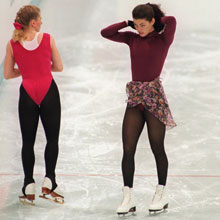1994 Lillehammer, Norway
The Lillehammer Olympics are considered to be the most successful Winter Games in history
Last Updated: Monday, February 1, 2010 | 2:57 PM ET
CBC Sports
.jpg) The Olympic flag is carried through the crowd at the opening ceremony of the 1994 Winter Olympics Games in Lillehammer. (Clive Brunskill/Allsport/Getty Images)
The Olympic flag is carried through the crowd at the opening ceremony of the 1994 Winter Olympics Games in Lillehammer. (Clive Brunskill/Allsport/Getty Images)
Two years after the Albertville Games closed, the Winter Olympics reappeared in Lillehammer, Norway. The 1994 Games did not suffer from the quick turnaround — the Lillehammer Olympics are widely considered to be the most successful Winter Games in history.
The decision to alternate the Winter and Summer Games was partly economic — it allowed nations and broadcasters to spread out their expenses — and partly to allow the Winter Olympics to climb out of the shadow of its higher-profile warm-weather counterpart.
Over 16 days, some 1,737 athletes represented a record 67 nations. Three years after the collapse of the Soviet Union, the Unified Team that collected ex-Soviet republics under its ad hoc banner at Albertville proved to have been a one-off, as born-again nations like Ukraine, Georgia and Russia competed as independent countries. The end of apartheid in South Africa opened the door for that nation to appear in the Winter Games for the first time in 34 years.
The Norwegians came up with an interesting and new spin on the traditional torch lighting ceremony. The torch arrived in Lillehammer via cross-country skies and once the torch reached the stadium a ski jumper slid down a jump and took flight before making a last handoff.
Interestingly, the man who jumped under the eyes of hundreds of millions around the world was not the organizers' original choice. His predecessor crashed the day before during a practice session.
Perhaps the Games' most heart-warming moment, one that stood in stark contrast to the Tanya Harding-inspired circus, was hard-luck American Dan Jansen's victory in the 1,000-metre event. Jansen had dominated the 500 and 1,000 sprint events on the World Cup circuit for several years, but had sadly come up short in previous Olympics.
At the Calgary Games Jansen fell twice, soon after learning of his sister's death from cancer. He fell again in Albertville, and then stumbled home in the 500 in Lillehammer. Many speed skating fans began to worry that the likeable, but seemingly jinxed Jansen would never get a medal. But he finally broke through in the 1,000 at Lillehammer — a victory made that much sweeter by Jansen's world-record time.
However, it was Italy's Manuela Di Centa who was the biggest winner of the Games, taking home five medals in cross-country skiing. Leading the men's medal count was none other than cross-country skiier Björn Dæhlie of Norway, with two gold and two silver medals.
Canada's performance
The Lillehammer Games were Canada's most successful ever, thanks in large part to the recent inclusion of freestyle skiing and short-track speed skating as official sports. In fact, the two events, dominated in Canada by Quebecers, accounted for six of Canada's 13 medals.
Jean-Luc Brassard won the gold in the men's moguls event, while two teammates with the Quebec Air Force, Philippe Laroche and Lloyd Langlois, took silver and bronze, respectively, in the aerials freestyle event.
Out on the short track, Nathalie Lambert took the silver medal in the women's 1,000-metre event while Marc Gagnon won bronze in the men's 1,000. The women's 3,000 relay team added another silver.
On the traditional speed skating oval, Susan Auch won the first of two straight Olympic silver medals in the 500, finishing behind legendary American Bonnie Blair, who retired after the Lillehammer Games with five gold medals. It was Auch's misfortune to be skating at the same time as two of the greatest 500 skaters of all time: Blair and, four years later, Canadian teammate Catriona Le May Doan.
In biathlon, Myriam Bedard won two gold medals in an unprecedented Canadian performance.
Figure skater Elvis Stojko took home a silver medal despite performing a program widely considered to be the best of the bunch. Stojko's martial arts-inspired routine, though technically outstanding, fell short among the judges who preferred Russian Alexei Urmanov's more traditional performance.
| Country | Gold | Silver | Bronze | Total |
|---|---|---|---|---|
| 1. Norway | 10 | 11 | 5 | 26 |
| 2. Germany | 9 | 7 | 8 | 24 |
| 3. Russia | 11 | 8 | 4 | 23 |
| 4. Italy | 7 | 5 | 8 | 20 |
| 5. USA | 6 | 5 | 2 | 13 |
| 6. Canada | 3 | 6 | 4 | 13 |







 Tonya Harding, left, of the USA stands next to compatriot Nancy Kerrigan during an early morning practice session. (Eric Feferberg/AFP/Getty Images)
Tonya Harding, left, of the USA stands next to compatriot Nancy Kerrigan during an early morning practice session. (Eric Feferberg/AFP/Getty Images)
